The refugee crisis. The boat people. Those bloody economic migrants. These are all words we’ve heard so often that they’ve lost their meaning and impact, and we’ve lost sight of what is actually happening just a short flight away from our shores.
The first time I can remember the crisis actually making an impact on me was in 2015 when, sat in a dingy hotel in Lockerbie, the morning news flashed up videos of barbed wire fences being slung up across the borders of Europe, borders that I myself had hitchhiked across just months previously. This sent a chill down my spine, knowing that the Europe I’d grown to love was changing before my very eyes.
Fast forward to 2016 and I was fortunate to meet Luath, a ex-staff member of KISC and an all-round fantastic character. She had been to Chios, a Greek island in a similar predicament to Lesbos (where 600,000 refugees had landed in the past 2 years). With a constant stream of refugees flooding across that narrow strait seperating Turkey from Greece (and thus Europe), the island was scene to never-ending horrors and tragedies. A week volunteering rescuing and aiding those who made it to the shores of this holiday island was enough to make her and another volunteer adamant to help more, and so they set up foodKIND, a charity focused on providing food and compassion to refugees and displaced people across the world.
Having grown more horrified by the stories I was reading from Greece and across the continent, I was keen to find a way that I could help personally. KISC was itself supporting and donating towards foodKIND throughout the Summer, and when the chance arose to join foodKIND on a mission to Greece I jumped at the opportunity.
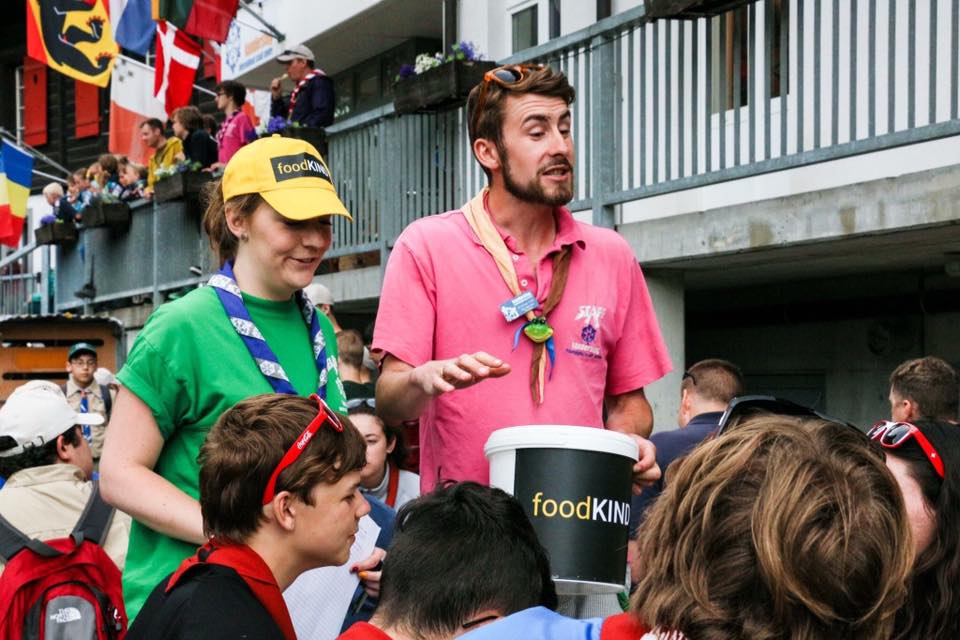
As is to be expected with situations like the refugee crisis, it is a constantly changing mosaic of demands and challenges, with charities, NGOs and governments all working to their own tune and to their own ends. As a charity foodKIND is explicit in its desire to work alongside other charities, and to collaborate to ensure the best outcome for those we are trying to help. As such, until we actually reached the city in Northern Greece, we weren’t sure exactly what we would be doing – we would have to see what the situation was on the ground before acting. It turned out that whilst refugees who were in the official UN run camps normally had at least some provision to food, there was a huge population of refugees living outside these official camps, on the streets of Greece’s second city. These people did not have access to even the basic amenities and so we decided to focus our efforts on helping them. A network of other charities were providing lunch and dinner, but for breakfast they were only receiving a banana each – so it was here that we focused our efforts.
Each morning we would serve up to 150 portions of breakfast to refugees and homeless Greeks across the centre of the city. This breakfast was something we would prepare the night before in our cramped Airbnb flat – and ranged from hearty flapjacks to delicious (and my new favourite breakfast meal) bircher muesli, along with a piece of fruit and a bottle of water.
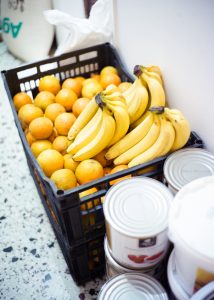
Once we had provided this, we would then support the other charities in preparing, cooking and distributing lunch and dinner. These meals would be cooked and vegan in constitution – not only did this massively reduce the risk of food poisoning associated with meat, but it was also much cheaper and allayed any concerns regarding Halal that might occur otherwise. Whilst we would buy all of the products we were using to create breakfast (yoghurt, oats etc) from local Greek stores, these other kitchens were often able to go around farmer markets at the end of the day and receive crates of unsellable vegetables (peppers, potatoes and aubergines for example) to use in their meals. This all helped keep the costs down to an absolute minimum and increased the number of people they could serve.
One thing which surprised not only myself but many of the volunteers was the calmness and civility of the food distributions. Having grown up with media images of distributions being panicky, riotous events, almost all of the distributions I was involved in were remarkably harmonious and controlled. We would go from family to family (for the people we were serving were by mostly families) and give out however many portions they said were in their unit – you quickly became adept at interpreting hand signals so that even if you didn’t speak their language you could communicate what was needed. The last 2 summers of working at KISC and communicating with Scout groups from around the world undoubtedly helped these skills and patterns too. The only time that it became more stressful during distribution was when several new families arrived who would continuously push their children forward to take more food, and these children would attempt to grab items from the crates you are holding. We had to be very strict and walk away from those who were trying to take more than they required, but the experience left me feeling very shaken.
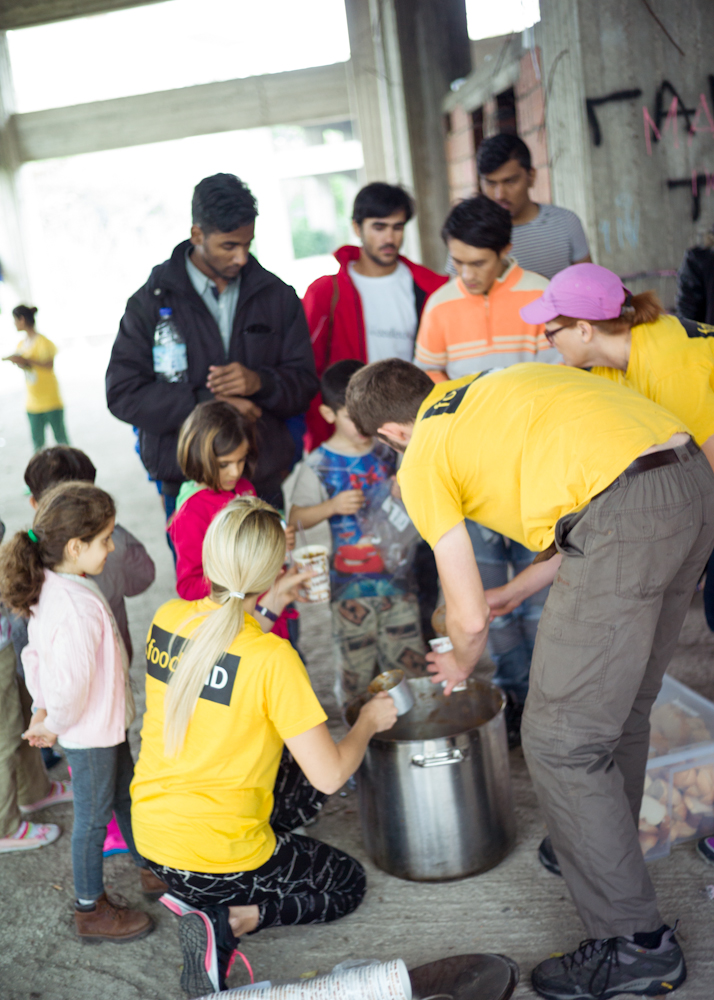
Whilst there were a few locations across the city where the refugees stayed, the vast majority were living in an abandoned building just south of the main train station. In what is an unfinished shopping mall, these people stay for anything from one night to several weeks, normally on their way up to the Macedonian border. This building was simply a concrete shell, with no running water, sanitation, or shelter from any winds / rain. Due to the lack of toilets, the people had taken to using one of the buildings as their toilet, meaning that there was a huge amount of human waste just lying on the floor mere metres away from where dozens of children were playing and living, which hygienically is a nightmare, not to mention it being an undignified location for anyone to live at. The building in which they were sleeping would simply be laid out with cardboard on the floor, and whatever the people had to keep them warm placed on top. For most people, this simply meant a few blankets or occasionally a sleeping bag – very rarely a family might have a small tent in which they would all attempt to fit into. With autumn firmly in place and winter rearing it’s vicious head just around the corner, it is extremely concerning to know that thousands of people will be facing many freezing nights without adequate cover – I have no doubt that this will not only be unimaginably uncomfortable but also deadly for many. I have spent several nights sleeping rough on the streets myself over the past few years (through my own choices whilst travelling I hasten to add), and there is no way to describe the deep pain and discomfort that installs itself in your bones once you get cold, and the dread that grips you once you know there is no hope of warming up until the sun comes around again. Combine that with the risk, nay certainty of rain and it is unimaginable what these people will be facing.
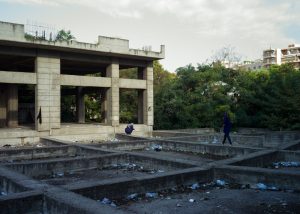
When the refugees weren’t battling the elements, they were often having to battle the Greek government. The building in which they were staying was techncially private property, and so the police would often turn up and forcefully kick all of the “squatters” out onto the street and insist they walk to a official camp – the nearest of which was over 10km away (one policeman said “If they’ve come all the way from the Middle East, they can walk another 10km to get there”). These evictions were stressful and scary – they would check your papers to ensure you had been officially logged by the Greek government, and if you hadn’t you risked being jailed for several months and/or being kicked out of the country.
The refugees were often in a set pattern though:
- Turn up at the abandoned building and stay a few days
- Attempt to be smuggled up to Serbia
- Be caught attempting to cross the border (either into Macedonia or Serbia)
- Be returned to an official camp
- Leave the camp and return to the building
This whole process would normally take 2 weeks, although it was common to hear people getting stuck and lost crossing the border and be wandering through forests for days at a time, without water, food or shelter. These people would often return with awful injuries to their feet, and in bad physical shape.
Leaving behind these people every day and returning to our apartment, with its beds and warm water and food, often felt like a betrayal. But it was also interesting, and worrying, seeing the fate of the other volunteers who were working out in Greece. It was a truly international crowd, with people from all across the world working together; Germans constituted the largest single nationality, in keeping with their political response at home. However, the magnitude of the situation threatened to overwhelm the limited resources that we had. Many of the volunteers and charities were running on minimal resources, with people working for several weeks without a single day off the norm. The risk of burnout seems high, and even after my 2 weeks I felt emotionally and physically drained, much more so than I was anticipating. The perennial issue was that if someone was to take a day off, it meant that a few hundred people might not eat that day. Left with that decision, the volunteers put their own health in the background and worked themselves to the bone to serve others. It was a truly humbling experience.
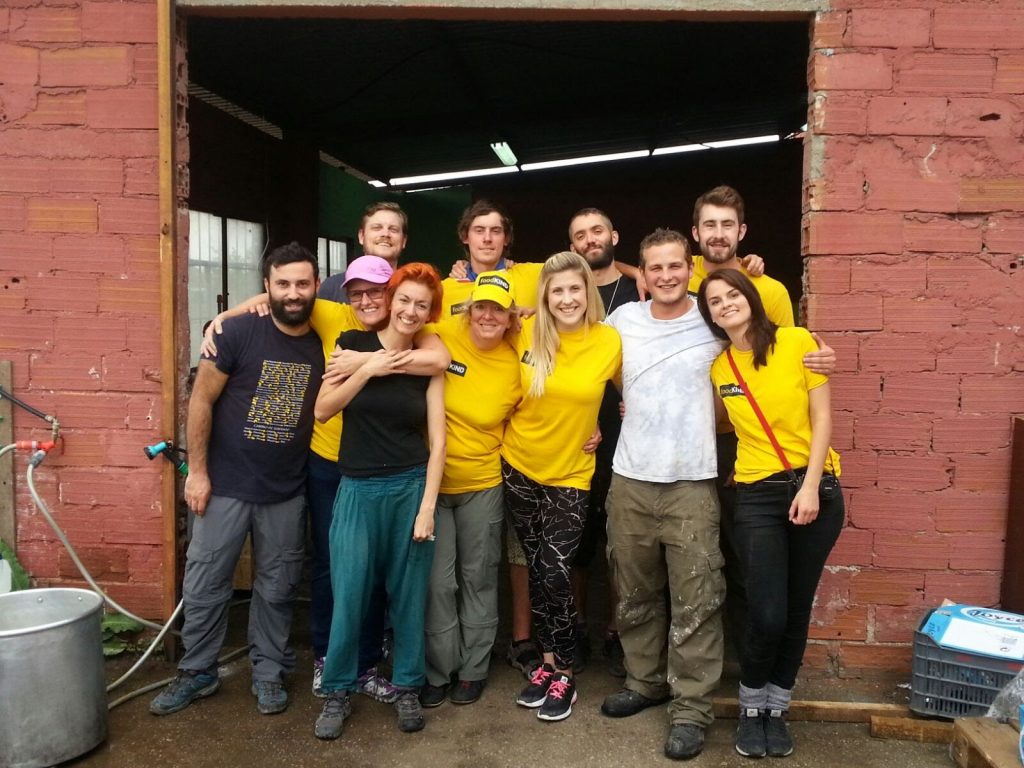
2016 has been a shock to the liberal, open and loving world that I thought I had grown up in. With the rise of far-right Nationalism all across Europe, the lie-based success of Brexit, and most recently the simply unbelieveable victory of Trump in the USA, it seems that people are being ever more insular and protective of their own, at the behest of all others. But the people that we were helping during these few weeks were no different to you or I. These were people who, given the option of staying with the threats of murder, rape, and extortion at home, gave up all they knew in the vague hope that there must be a better life to live out there, a life where one does not have fear lingering over them like a vulture waiting for its pound of carrion. I saw babies, children, parents, grand parents, all living through a horror none of us can imagine, all hoping for a life worth living. If, like many of us, you have been watching this from afar with concern but with a feeling of apprehension as to how you can help, please believe me when I say that you can truly help, in a huge number of ways. You can donate money to charity (www.foodKIND.org or any number of others), collect clothes to help with the cold winter ahead, you can raise awareness to others in your local area, or you can even donate your time and head to the crisis areas themselves. Every little bit you can do really does help, and its only with your help that we can attempt to make this crisis a little more bearable for those lives this crisis is shaping.
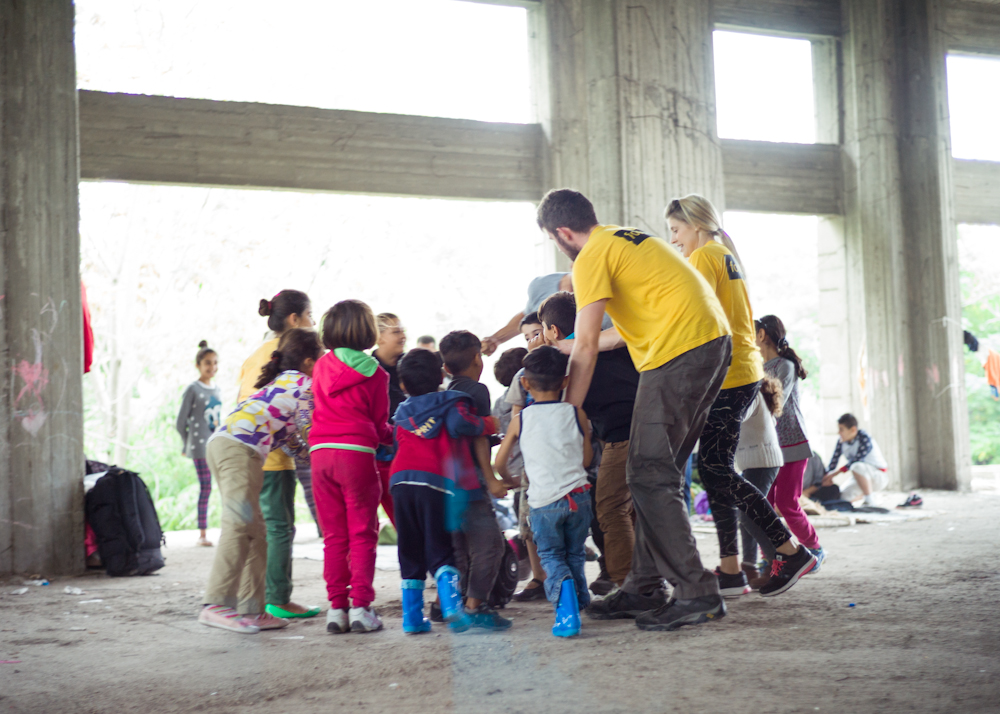 Once food distribution was complete, we would make sure we had time to play with the children and talk to the adults. With games and songs, this was often the one source of normality and love in an otherwise bleak environment
Once food distribution was complete, we would make sure we had time to play with the children and talk to the adults. With games and songs, this was often the one source of normality and love in an otherwise bleak environment
P.S. If you would like to know more about the situation, I cannot recommend watching the film “4.1 Miles” highly enough. It is a intensely moving viewing, but one which should be compulsory watching for anyone who thinks they have an opinion on this crisis.
P.P.S. For an even better blog than mine, with more fantastic photos, also check out David Lohmueller’s blog. I had the privilege of working with him whilst he was out in Thessaloniki, and you will struggle to come across a more dedicated, genuine and effective guy. His photos and writings are also exquiste. Check him out.
[…] fulfilled and decided they could help. You can read my previous experiences with foodKIND here https://pridding.co.uk/foodkind-october-2016, but essentially they support migrants who are in crisis situations and provide some food security. […]